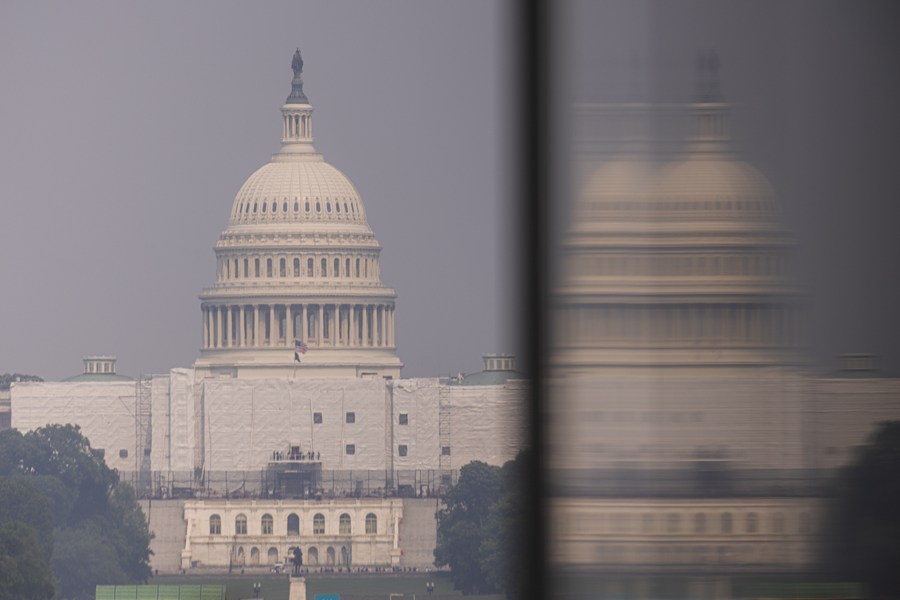
The US Capitol building is shrouded in haze in Washington, DC, the United States, on June 7, 2023. [Photo/Xinhua]
This is an editorial from China Daily.
Sanctions have never been instrumental in resolving an international conflict. And the sanctions regime imposed by the United States against Russia has only fanned the flames of the conflict in Ukraine and worsened the plight of the Ukrainian people.
Yet, as if to conceal its inability to help Ukraine win the upper hand on the battlefield, the US announced on Wednesday that it has slapped a new round of sanctions on over 300 individuals and entities that it claims are enabling Russia to sustain its military campaign in Ukraine. The US has repeatedly alleged in recent months that China is supplying Russia with dual-use goods so it is no surprise that Chinese entities and individuals are included on the list of those being sanctioned.
Speaking to the media ahead of the G7 Summit in Italy, US National Security Advisor Jake Sullivan said that the targets of the sanctions include "major nonbank entities that help Russia finance its war effort and evade sanctions; entities and individuals across multiple evasion and foreign procurement networks, like networks that support Russia's UAV production, gold laundering, and procurement of sensitive items such as anti-UAV equipment, machine tools, industrial materials and microelectronics".
While the US claims that it wants to make it harder for Russia to source crucial technology for its military, by targeting over $100 million in trade with Russia, the US is putting itself above international law and using sanctions to support what is in purpose and effect its own war effort. The US has a penchant for using such duplicitously presented long-arm coercion to serve its own agenda. Its sanctions regime is notoriously weaponized.
To uphold international justice and fairness, the world must act to counter the US' illegitimate unilateral sanctions. Beijing will therefore adopt countermeasures in response to the US' latest sanctions on more than two dozen Chinese entities and individuals.
The US' targeting of countries' normal trade relations with Russia has no basis in international law. Nor is there any United Nations' resolution banning countries from conducting normal economic exchanges with Russia or Ukraine. China has a legitimate right to maintain normal trade ties with any country, including the two belligerent parties in the Ukraine crisis.
As the conflict in Ukraine continues to drag on, there has been growing public opposition in Western countries to their governments prolonging the conflict by providing weapons and assistance to support Ukraine's war effort. Western leaders are desperate to help Ukraine drain Russia's strength. But the US is barking up the wrong tree by sanctioning China as Beijing is neither a party to the conflict nor providing support to the military of either of the belligerents. The self-serving US move does a disservice to the international efforts to broker peace in Ukraine by creating conditions to bring the two battling parties to the negotiating table.
Yet, it seems that not content with this, the US also intends to push the G7 countries to follow its lead in its proxied aggression against Russia by supplying substantial resources, military assistance, intelligence and economic support for Ukraine.
Since the Ukraine conflict started, the US has rallied European countries to provide a colossal amount of military aid to Kyiv. This month, Western leaders have also given the green light for Kyiv to use Western-supplied weapons to strike targets inside Russia, painting an even gloomier picture of a wider and deeper crisis at the heart of Europe. The US has also rallied its allies to slap sanctions on Russia and third parties, which has disrupted the global financial system and international supply chains.
The US should get off its high horse. Ahead of the G7 Summit, the nonprofit organization Oxfam released analysis showing that the G7 countries could end global hunger by allocating just 2.9 percent of their annual military spending to solving the world food debt crisis. The US should put its feet on the ground so that it can join with others on the right course to resolving not only the Ukraine conflict through dialogues and negotiations but also the crises at the heart of the sustainable development agenda.

 中文
中文



